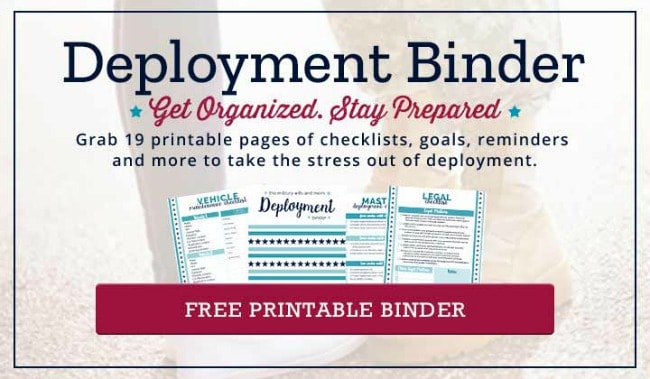You might hear this infamous stereotype time and time again—military spouses are lazy, uneducated, and by the way, they never work. It’s kind of irritating actually. Especially if you are a spouse, like most are, who is hard-working and supports her family equally as much as her spouse.
There are a lot of reasons why military spouses are both unemployed and under-employed, meaning most military spouses take jobs in which they are over-qualified because they cannot find work to match their skills.
Many of these lies and truths will resonate with you if you are a military spouse. They are after all based on a 2013 survey taken by military spouses. And if you are not a military spouse, I hope this post can shed genuine light on the real issues military spouses face in today’s job market. I hope these reasons help educate others and encourage us all to unite and find more reasonable solutions to this chronic issue.
Lie: Military spouse jobs are easy to find after moving.
Truth: Many military spouses are frequently out of work due to preparing for or recovering from a military PCS move.
I cannot tell you how many military spouses I know who found great jobs in their local area, worked hard, made advancements, and then had to quit a year or two later due to a PCS move. With each military mandated move, military spouses are forced to start over in the job market. Looking for work in a specialized field of work takes time and energy.
Recently, a friend left her job as a nurse one month before a PCS move. Following the PCS she worked hard to find employment and landed a job within a few months. The problem is the government agency took over 6 months to complete her hiring process. This is the norm for many government agencies. So from the time this spouse left her job until she officially started getting paid, we are talking 9 months. That’s crazy when you realize she will likely move again within 2 years of starting the position. A 9 month gap in employment is a long time for a military spouse with an education and excellent work experience in a job market that has openings. What does the employment gap look like for spouses with less than ideal circumstances?
Are you a small business owner, a marketing manager, a cosmetologist, a financial planner? These jobs provide limited positions and make it challenging to get hired after moving around from duty station to duty station.
Lie: Military spouses use their service member’s job as an excuse not to find work.
Truth: Military spouses cannot find work flexible enough to accommodate their spouse’s schedule.
A 2013 study discovered “there is not a lack of desire to work that is causing these gaps; over 55% of respondents indicated they “need” to work, while 90% indicated they “want” to work.” (Source).
I believe that most military spouses would love to work if the right circumstances presented themselves. Like many military spouses, I gave up my career to stay-at-home full time. Given the stress that my husband’s military career puts on our family, we agreed together that having one spouse home full-time to manage the children, the household, and all of our general life affairs was imperative to our long-term happiness. Many military spouses want to be able to stay home and care for their children because it’s what is best for the whole family, not because it’s easier than working at a conventional job.
Lie: Military spouses get hired equally as much as civilians.
Truth: Military spouses actively seeking employment experience countless challenges.
Many organizations are ambivalent over hiring military spouses, knowing they won’t be around for long. It’s plain and simple: Companies want to invest in long-term employees in in order to avoid costly expenses associated with high employee turnover.
In addition, many organizations are reluctant to hire prospective employees with short employment stints and gaps in unemployment all over their resume. Military life takes the everyday career woman’s resume and makes it look shady.
“In 2012, 18-24 year-old Armed Forces female spouses had the highest unemployment rates at 30 percent (which is almost three times higher than their civilian counterparts at 11 percent). 25-44 year-old Armed Forces female spouses had the second highest unemployment rates at 15 percent (almost three times higher than their civilian counterparts at 6 percent).” (Source)
Lie: Military spouses don’t make an effort to obtain an education.
Truth: Military spouses struggle to obtain an education more than civilian counterparts.
There are so many military spouses who leave college behind to PCS with their service member. With frequent mandatory PCS moves, many military spouses leave behind countless college credit hours. Some leave college behind altogether, while others frequently start over at a new university.
The biggest problem is often that a military spouse cannot complete a degree at a given university or college before it’s time to PCS again. At this point, spouses often leave a university, transfer as many credits as possible, and start again. It’s incredibly frustrating that credits do not transfer from university to university. A military spouse may take a class over and over again, despite passing on the first go around.
Nowadays, many military spouses are turning to online college degree programs to better meet their needs. This is a great option for spouses coping with frequent moves, but at the same time, it’s unfortunate that spouses are not able to enjoy a traditional university experience.
Lie: Military spouses turn down jobs they think are beneath them.
Truth: Military spouses cannot find work that match their skills and education.
Even after obtaining an education, it’s still be a struggle to find job. 90 percent of working military spouses report being underemployed. This means that military spouses possess more formal education/experience than needed at their current or most recent position.
Moving from duty station to duty station it’s challenging to find work in a niche specific area. And if you think all military spouses should just go work at just any under-paying job that comes their way, then you might as well say service members should get out of the military and go work at Banana Republic.
Even more discouraging is finding jobs at OCONUS duty stations. At our current overseas duty station, qualified local citizens are given hiring preference over equally qualified military spouses. So even if someone wanted to argue that military spouses should just go work at the PX, I can confidently tell you that at some duty stations that is not even an option. Those jobs are already filled and offered to local citizens.
What needs to be done?
Military spouse unemployment and under-employment is an issue deeply rooted in the military community. This is not an individual military spouse issue in my opinion. Here are a few realistic solutions that I believe could make a huge improvement for military spouses across the board:
- Decrease the frequency of PCS moves.
- Offer greater resources for military spouses to obtain an online education that will transfer from duty station to duty station.
- Offer greater employment placement assistance for military spouses.
- Offer more military spouse jobs through government agencies that are work from home and transfer from duty station to duty station.
- Increase access to childcare, offering flexibility for military spouses with unconventional working hours.
- Increase military spouse hiring preference for government jobs.
Want more on military life?
- 43 Awesome Tips Every New Military Wife Needs to Know
- The One Phrase That Will Reconnect Your Military Marriage
- 18 Ways Military Life Changes You for the Better
- 7 Myths About Military Life…Debunked
What do you think is the real reason military spouse unemployment is so high? Let’s chat in the comments!








When I left my management job in corporate America to be with my spouse at Ft. Hood, I had no idea what I would find. Not only were there no corporations that needed me around here. I looked around for anything, and found that some employers placed in the job requirements that you MUST be available for IMMEDIATE relocation. That is codespeak for Military Spouses don’t apply. I joined a few professional and civic organizations only to learn that the Good Ole’ boys network is alive and well and if my daddy didn’t go to school with his daddy I wasn’t going to get a job. I used my CAA to get an RN degree and got hired at the local VA and never looked back!
As an Army spouse of 17 years, I can attest that ACS has come a long way when it comes to providing resources to spouses. They have so many underused services when it comes to employment. With the OCONUS problem, the jobs go to local nationals because it is stated in the SOFA agreement, with the host nation, that a specific percentage of jobs will go to locals. Germany is 70%. Your information makes it sound as if AAFES and other organizations don’t want to employ spouses, when that is not the case. I think you are spot on, otherwise. Being at my second OCONUS duty station, I can say it is discouraging when you have a lot of education under your belt, and cannot find anything at all.
Man Lauren you really hit the nail on the head with these lies and truths! As a new military spouse I have pondered this topic all too often. Being in the insurance industry I really want to use my skills and education to help others while also contributing to our financial goals. Then there’s my husband’s schedule. Nothing feels normal. It’s always a challenge to balance our schedules. Funny thing is we. do not even have kids yet!
The struggle is real. Thank you for putting this article out there to spread the awareness. Your recommendations to provide a solution are great. I personally am taking the leap into self employment selling life insurance online and over the phone. As I am licensed in all states it is something I can take with me after a PCS.
It’d be great to empower and teach military spouses who have a skill or passion to set themselves up for self employment. Not all careers work best for this but I wish the military had some sort of program and/or assistance for this.
Thank you!
This is a great article, thanks Lauren!
It also depends on the location you get posted to that determines if you can get work.
My husband is in the Australian army, and we’ve just finished a posting in a remote area. We had no family support around so it did make finding a job quite challenging.
I do find it hard to establish myself in our new location job wise, only to then move on within 2 years anyway
Yes. You are a perfect example. Thank you so much for sharing !
Lauren
Apipicrateon for this information is over 9000-thank you!
This is completely true!
I moved and married with my husband ALOT, and when your 20-25, you should be going to school, I had to transfer so many times. my husband got stationed a s a recruiter and I took as many classes as I could, I had a baby a year and a half ago not, and last month graduated. I took 43 credits, or 13 classes this year with my little one. my GPA dropped from a 3.84 to a 3.47 because my husband would not help when he was home, and I missed midterms, since I do not work, taking a very heavy college load and I cant afford day care, and there is NO family here, nor friends, since we ;live 2 hours from a base. We also had only one car and with his unpredictable hours I could not work. When we got married originally I left my vehicle behind,. when I came home it never worked again from sitting, so one vehicle it was.. I am moving home to my family now to get a stable job, nothing is worse than depending on someone else, military spouse roles are terrible, they suck the life out of you, you have to depend on someone, your school job, life has to be given up to move if its called for, your support network and family cannot be there to help when needed, and god forbid your service member become an abuser after an especially long deployment. I would not do this again. I turned 26 not even a month ago and I simply can’t do this. I have a terrible spouse though, I gave everything up for him and he instead has run me into debt, given me terrible self esteem, robbed me of precious years with my family and is a compulsive cheater, but before that last deployment he was wonderful, sweet, kind, helpful, loving, he had manners, ect, then when he came home he just was a terrible, terrible person. Good Luck Ladies. Put yourself as a priority, because frankly, no one else every really will.. Sure, it can be great, and your spouse must treat you with respect, and loyalty, but you never know what they will be like 5 years down the road, deployment later. Just never put yourself to the side completely because everything is able to change on a whim and you need to protect yourself.
Pretty great post. I simply stumbled upon your weblog and wished to mention that I’ve truly enjoyed surfing
around your blog posts. In any case I’ll be subscribing to your feed and
I hope you write again very soon!
As a stay at home mom who homeschools I’m saddened you didn’t mention those who choose to stay home because it’s whats best for their children. My husband and I both decided I’d stay home once we had kids. It’s hard to live on one income and being a stay at home IS a full time job. Not having a paying job doesn’t mean you are lazy.
Hello, I was hoping someone can help. I have emailed and tried to talk to the unemployment office and they are not answering my question. They keep directing me to file a claim and I’m not ready to. My husband’s report date is July 10th. We live in wisconsin. I don’t want to quit my job too early and not be eligible but I cannot seem to find the information on what timeframe. I read certain states won’t approve it if you quit prior to 15 days before the report date. Any help is appreciated
Thank you for writing this. My military husband retired ten years ago. I struggled finding work throughout his career. Opportunities were limited or just not there. Just finding a job, never mind a career or dream, was difficult. We moved often. Bases closed while we were there. Short tours. On one long tour, we moved within country. Government downsizing. …and so on. Other military spouses needed work too, and many were willing to work for low pay, thus making it even more difficult to find something worth it. I kept blaming myself, but when I wrote down every assignment, I realized it was lack of opportunity. It seemed survival mode was how I lived… just find something. Anything. Sadly, I stayed in that survival mode when my husband retired and moved on to his next career. My fault, but a hard habit to break. I took a job in a field I hated so we could get by (military retirement pay is nice, but not enough to live on). I did this through an unexpected job loss and am now feeling it’s too late to start (not over, just start). Anyway, I am grateful for military retirement benefits and all of the places we’ve been and people we’ve met, but career / work was a struggle for me. Are there any wives in their 50s who have stared careers? Thanks.
I know this was written a few years ago. But I also have to say thank you! I am having such a hard time dealing with the fact I am not going to go to the next duty station with my husband. After 17 years I had to make the tough decision of leaving a career I love or moving again for the man I love. With only 3 years left I had to think of our future. He is going to Germany and I am an educator. There are 0 opportunities for me there other than subbing, which pays very little and makes me feel even littler. I did it before in the Netherlands and it was crushing to do the same job as for only a fraction of the pay. Bea it is never to late. I had to start over in my 40s and I know of others in their 50s. It is just finding what you love and going for it.